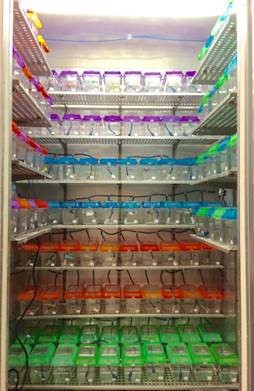DENTON (UNT), Texas - On April 20, 2010, a massive explosion on the Deepwater Horizon oil platform in the Gulf of Mexico led to 11 people being killed and millions of gallons of oil spilled. The oil spill was an instant change to the environment for the animals and plants that live in that water. Since 2015, Warren Burggren and his colleagues in the RECOVER Consortium from the Department of Biological Sciences at the University of North Texas have been researching how the spill lead fish to adapt in order to survive.
Burggren is a comparative physiologist who has for decades studied how animals have changed to adapt to their environment. This latest research, funded by the Gulf of Mexico Research Initiative, has allowed him to see up close the impact of a new stress to an organism — in particular the oil’s impact on fish like mahi-mahi. He’s been looking at heart function, respiration, metabolism and overall survival changes to see how fish are passing on advantages that helped them survive the spill. Burggren says these advantages are not conventional evolution, but epigenetic inheritance, which is basically a short-term way to help animals overcome tough conditions without any long-term changes to their genes.
“Collectively we think epigenetic inheritance is fascinating because it’s a short-term bridge to get over environmental challenges,” said Burggren. “So if the parents of fish are exposed to oil, the next generation has an increased resistance to oil. However, this resistance may only last a few generations and go away when all the spilled oil is finally gone.”
To make this discovery, the researchers at UNT recreated the conditions of the Gulf oil spill in a smaller, contained environment. The offspring of fish exposed to those conditions were tested and showed a resistance to the pollution, but had no changes to their genes.
“This is a good sign for these fish. It means more can survive,” said Burggren. “If they had to evolve or create a genetic mutation, there would be a dramatic decrease in the amount of these fish that had resistance, and they would all permanently be changed. With epigenetic inheritance, it’s like instant gratification, without being stuck with a trait that could end up being harmful down the line.”
While Burggren says his research team has already accomplished much with their research, there is more work to be done.
“If you can find an epigenetic link in just one study, you’ve proven it exists,” he said. “We have answered a lot of questions, but now we have to see if it’s happening in other areas animals in other habitats.”





